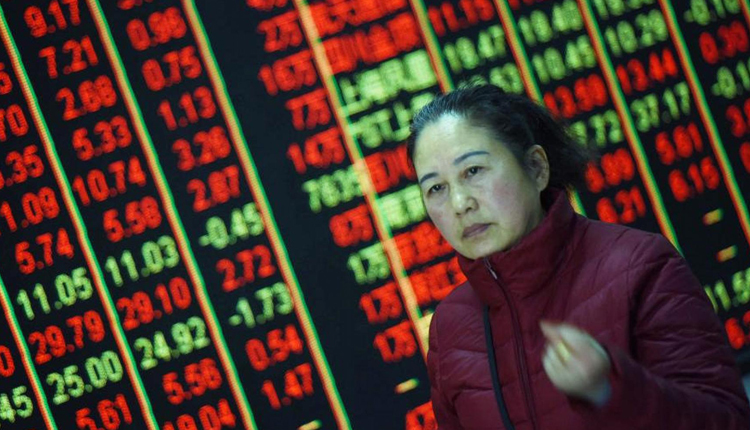Asian markets were broadly lower on Thursday afternoon after the U.S. Federal Reserve raised interest rates for the fourth time in 2018.
The mainland Chinese markets were lower by the end of the morning session, with the Shanghai composite slipping 0.82 percent and the Shenzhen composite declining by 0.201 percent.
China-listed shares of major banks declined as Industrial and Commercial Bank of China fell 1.88 percent, Agricultural Bank of China shed 1.70 percent and China Construction Bank dropped 2.29 percent. Financial stocks make up nearly 40 percent of the Shanghai composite.
The Chinese central bank announced its decision to keep short-term borrowing rates steady on Thursday, a day after unveiling measures to encourage lending to small firms.
Hong Kong’s Hang Seng index fell 1.13 percent to about 25,574.32, with Hong Kong-listed shares of HSBC declining by 0.86 percent.
Japan’s Nikkei 225 slipped more than 3 percent in afternoon trade while the Topix index declined by 2.75 percent. Shares of conglomerate Softbank continued to remain under pressure on Thursday, slipping more than 3.5 percent in the afternoon, a day after the lackluster public debut of its mobile unit on Wednesday.
Shares of the newly listed Softbank Corp fell as much as 8 percent earlier on Thursday, according to Reuters, before recovering to trade at about 0.23 percent higher in the afternoon.
Meanwhile, South Korea’s Kospi shed more than 1.4 percent, as shares of LG Electronics declined by 4.75 percent. John Ko, an analyst at NH Investment and Securities, estimated a 15 percent year-on-year decline in fourth quarter operating profit for LG Electronics, citing weakness in sectors such as its television and smartphone divisions.
The ASX 200 in Australia also saw losses as it traded down by 0.76 percent, as shares of the country’s so-called Big Four banks declined. Australia and New Zealand Banking Group fell 1.23 percent, National Australia Bank slipped 0.81 percent, Commonwealth Bank of Australia shed 0.29 percent and Westpac lost 0.33 percent.
Semiconductor-related companies hit
Shares of semiconductor-related companies saw significant declines on Thursday, with chipmakers SK Hynix and Taiwan Semiconductor Manufacturing Co. declining 3.15 percent and 1.55 percent respectively.
Over in Japan, Tokyo Electron, which manufactures semiconductor equipment, was down more than 4 percent while semiconductor test equipment manufacturer Advantest fell 4.37 percent.
The moves in the sector came after shares of American chipmaker Micron Technology plunged almost 8 percent on Wednesday, a day after it lost more than 6 percent in after-hours trading on Tuesday following a revenue miss.
Despite the dismal performance of the stock, Sanjay Mehrotra, president and CEO of Micron, told CNBC’s “Mad Money” in an exclusive interview on Wednesday that “end-market demand drivers for memory and storage continue to be vibrant. ”
Fed hikes rates
Overnight on Wall Street, the major indexes hit new closing lows for 2018. The Dow Jones Industrial Average dropped 351.98 points to close at 23,323.66 while the S&P 500 shed 1.5 percent to end the trading day at 2,506.96. The Nasdaq Composite fell 2.1 percent to close at 6,636.83.
That came on the back of the Fed raising its benchmark interest rate by a quarter point to a target range between 2.25 to 2.5 percent, in a widely anticipated move.
The move marked the fourth increase this year by the U.S. central bank and the ninth since it began normalizing rates in December 2015. It came despite President Donald Trump’s tweets against rate hikes. On Monday, he said “it is incredible” that “the Fed is even considering yet another interest rate hike” amid the turmoil outside of the U.S.
Officials, however, now project two hikes next year, which is a reduction but still ahead of current market pricing of no additional moves next year.
The language in the post-meeting statement was also not entirely dovish, or easy on its outlook for rates. The committee continued to include a statement that more rate hikes would be appropriate, though it did soften the tone a bit.
“What was a bit surprising is that the post (meeting) statement says that ‘some further gradual increases (my emphasis) in the target range for the federal fund rate will be consistent….”. The expectation here was that all reference to ‘gradual’ could be dropped, significantly a formal end to the Fed being on ‘auto-pilot’ with respect to its rate rise cycle to date, as long as the economy and inflation were broadly performing as expected,” Ray Attrill, head of foreign exchange strategy at National Australia Bank, said in a morning note.
“We’d nevertheless judge that the Fed has now moved into fairly full-blown ’data dependency mode,” Attrill said.
Currencies
Central bank meetings will be in focus today. The Bank of Japan on Thursday announced its the widely expected decision to keep interest rates targets unchanged amid global risks. The Bank of England will also be meeting on Thursday — analysts are not expecting any changes to interest rates.
The U.S. dollar index, which tracks the greenback against a basket of its peers, was at 96.983 after seeing a high of 97.041 earlier in the session.
The Japanese yen, widely viewed as a safe-haven currency, traded at 112.30 after seeing an earlier low of 112.60. The Australian dollar was at $0.7105 after declining from levels around $0.72 yesterday.
Source: CNBC


